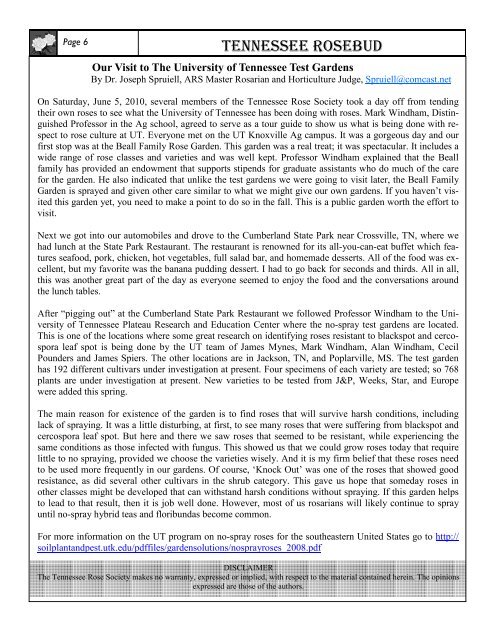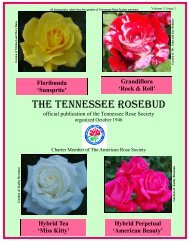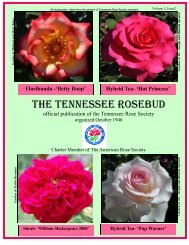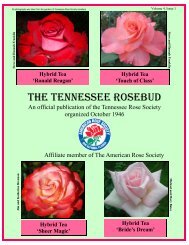THE TENNESSEE ROSEBUD - Tennessee Rose Society
THE TENNESSEE ROSEBUD - Tennessee Rose Society
THE TENNESSEE ROSEBUD - Tennessee Rose Society
Create successful ePaper yourself
Turn your PDF publications into a flip-book with our unique Google optimized e-Paper software.
Page 6 <strong>TENNESSEE</strong> <strong>ROSEBUD</strong><br />
Our Visit to The University of <strong>Tennessee</strong> Test Gardens<br />
By Dr. Joseph Spruiell, ARS Master Rosarian and Horticulture Judge, Spruiell@comcast.net<br />
On Saturday, June 5, 2010, several members of the <strong>Tennessee</strong> <strong>Rose</strong> <strong>Society</strong> took a day off from tending<br />
their own roses to see what the University of <strong>Tennessee</strong> has been doing with roses. Mark Windham, Distinguished<br />
Professor in the Ag school, agreed to serve as a tour guide to show us what is being done with respect<br />
to rose culture at UT. Everyone met on the UT Knoxville Ag campus. It was a gorgeous day and our<br />
first stop was at the Beall Family <strong>Rose</strong> Garden. This garden was a real treat; it was spectacular. It includes a<br />
wide range of rose classes and varieties and was well kept. Professor Windham explained that the Beall<br />
family has provided an endowment that supports stipends for graduate assistants who do much of the care<br />
for the garden. He also indicated that unlike the test gardens we were going to visit later, the Beall Family<br />
Garden is sprayed and given other care similar to what we might give our own gardens. If you haven’t visited<br />
this garden yet, you need to make a point to do so in the fall. This is a public garden worth the effort to<br />
visit.<br />
Next we got into our automobiles and drove to the Cumberland State Park near Crossville, TN, where we<br />
had lunch at the State Park Restaurant. The restaurant is renowned for its all-you-can-eat buffet which features<br />
seafood, pork, chicken, hot vegetables, full salad bar, and homemade desserts. All of the food was excellent,<br />
but my favorite was the banana pudding dessert. I had to go back for seconds and thirds. All in all,<br />
this was another great part of the day as everyone seemed to enjoy the food and the conversations around<br />
the lunch tables.<br />
After “pigging out” at the Cumberland State Park Restaurant we followed Professor Windham to the University<br />
of <strong>Tennessee</strong> Plateau Research and Education Center where the no-spray test gardens are located.<br />
This is one of the locations where some great research on identifying roses resistant to blackspot and cercospora<br />
leaf spot is being done by the UT team of James Mynes, Mark Windham, Alan Windham, Cecil<br />
Pounders and James Spiers. The other locations are in Jackson, TN, and Poplarville, MS. The test garden<br />
has 192 different cultivars under investigation at present. Four specimens of each variety are tested; so 768<br />
plants are under investigation at present. New varieties to be tested from J&P, Weeks, Star, and Europe<br />
were added this spring.<br />
The main reason for existence of the garden is to find roses that will survive harsh conditions, including<br />
lack of spraying. It was a little disturbing, at first, to see many roses that were suffering from blackspot and<br />
cercospora leaf spot. But here and there we saw roses that seemed to be resistant, while experiencing the<br />
same conditions as those infected with fungus. This showed us that we could grow roses today that require<br />
little to no spraying, provided we choose the varieties wisely. And it is my firm belief that these roses need<br />
to be used more frequently in our gardens. Of course, ‘Knock Out’ was one of the roses that showed good<br />
resistance, as did several other cultivars in the shrub category. This gave us hope that someday roses in<br />
other classes might be developed that can withstand harsh conditions without spraying. If this garden helps<br />
to lead to that result, then it is job well done. However, most of us rosarians will likely continue to spray<br />
until no-spray hybrid teas and floribundas become common.<br />
For more information on the UT program on no-spray roses for the southeastern United States go to http://<br />
soilplantandpest.utk.edu/pdffiles/gardensolutions/nosprayroses_2008.pdf<br />
DISCLAIMER<br />
The <strong>Tennessee</strong> <strong>Rose</strong> <strong>Society</strong> makes no warranty, expressed or implied, with respect to the material contained herein. The opinions<br />
expressed are those of the authors.





